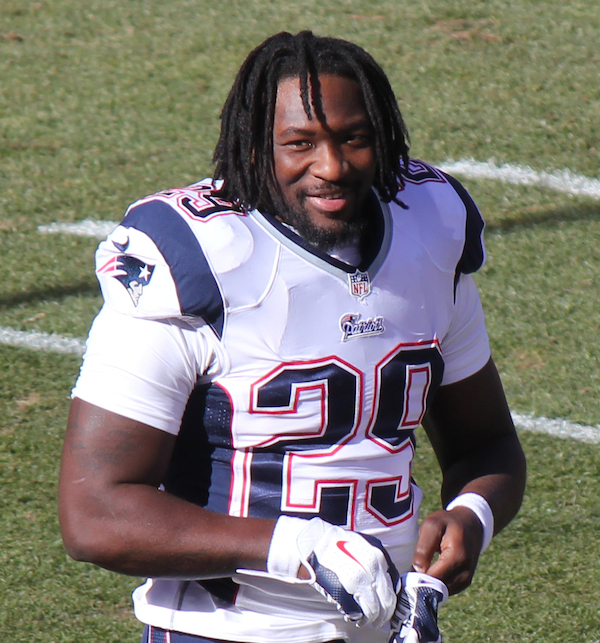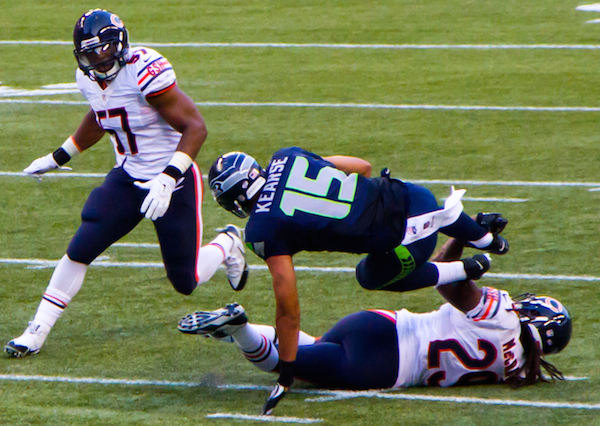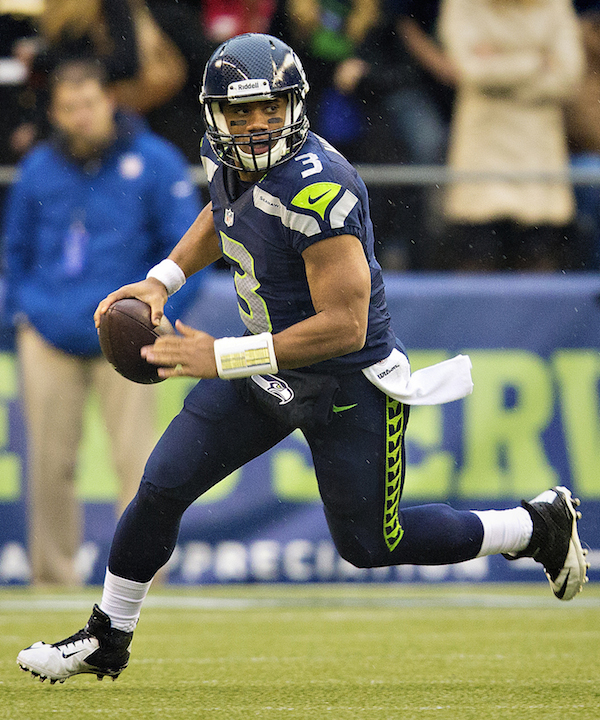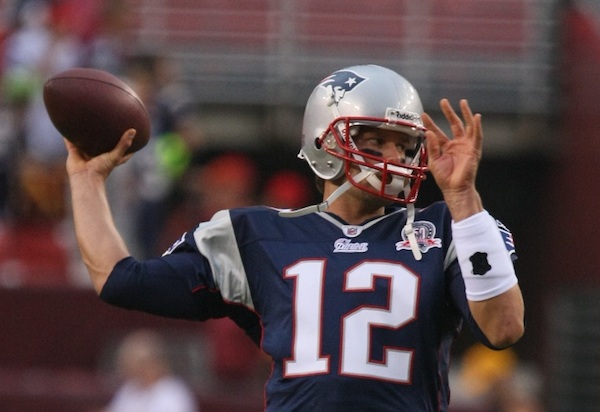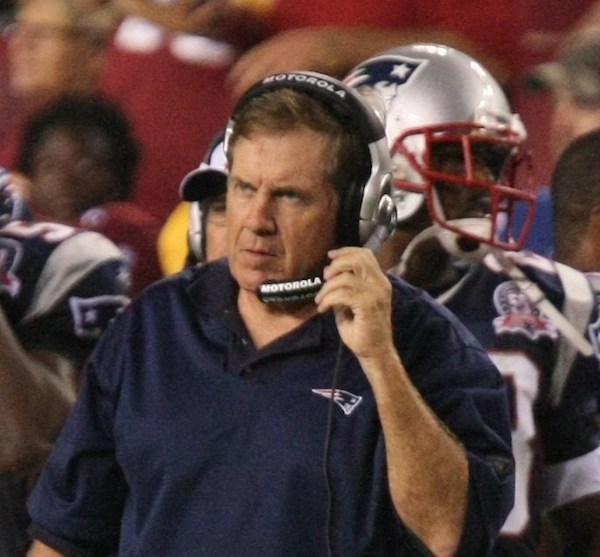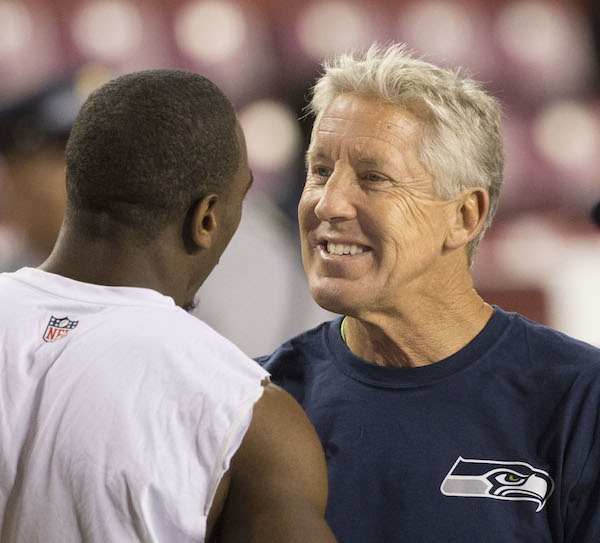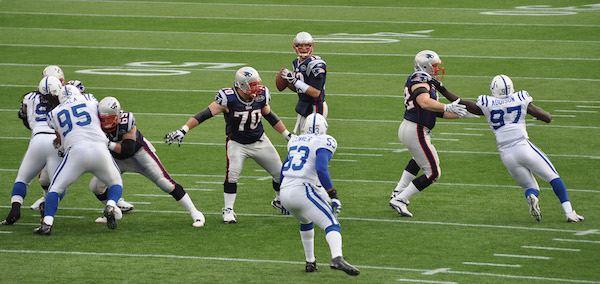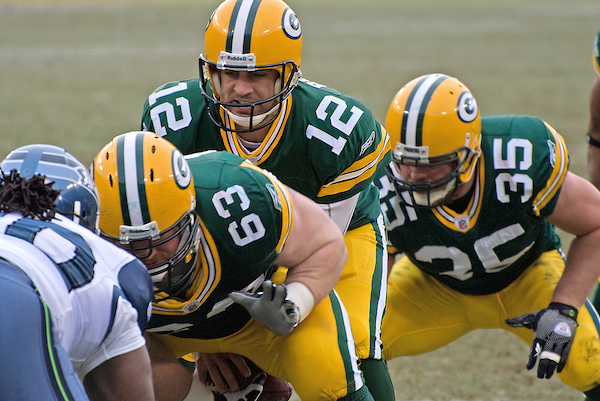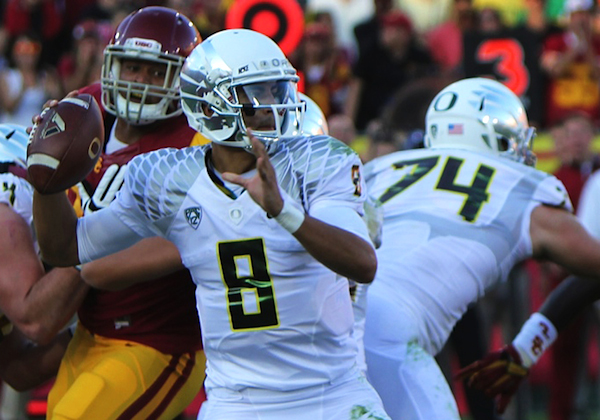You rarely hear someone refer to Tom Brady without following his name with the phrase, “the golden boy.” Brady is the prototypical quarterback. He’s tall, handsome, and athletic. He’s an unquestioned leader. He is successful on the field and off the field. He inevitably evokes a strong response from people. Either you want to be him or want to be with him or you can’t stand his smug, arrogant ways and you are annoyed that one person (other than you) could be so lucky.
What is Tom Brady’s background?
Tom Brady was not the star athlete in his family as a child. Nope, that was his three older sisters, Maureen, Julie, and Nancy. Each of them played sports and Tom went along with his parents to cheer them on. Jeff Arnold describes the family in his 2012 article on The Post Game as being extremely close. It certainly sounds like that was true. As a child, Brady loved football and convinced the family to go to San Francisco 49ers home games, just a short drive from their home in San Mateo, but his first sport was always baseball. He was good enough at baseball to be selected by the Montreal Expos in the 1995 Major League Baseball draft. Instead of committing to baseball, Brady chose to go to the University of Michigan as a quarterback.
This turned out to be a great decision but it may not have seemed like one at the time. According to Wikipedia, when Brady first went to Michigan, he was seventh on the quarterback pecking order! For the first two years of his college career, he sat while the incumbent quarterback, Brian Griese led the team. After Griese left, you might have thought the job would go exclusively to Brady, but it did not. Although he started every game, he continuously had to battle another quarterback, Drew Henson, for playing time. Michigan’s coach at the time though it was a good idea to rotate quarterbacks during the game. Despite this, Brady played well and became an acclaimed and successful college quarterback.
Given his success in the NFL, you would be forgiven for assuming that Brady was a high draft pick. He was not. The New England Patriots drafted Brady in the sixth round of the 2000 NFL draft as the 199th player selected. Why so low? To start with, very few successful NFL quarterbacks have trouble winning the starting job in college. Brady did. On top of that, Brady performed poorly at the annual NFL combine where players are measured on physical attributes and perform drills to measure their athleticism. Brady was relatively slow and weak. It’s actually pretty remarkable. If you watch the videos from back then, Brady looks slow and somewhat awkward not just in the context of football. It almost looks like you or I could beat him in a race.
New England saw through that and selected him anyway, even though they had a starting quarterback in the prime of his career. Brady, familiar with the bench from his college days, went right back there in his first year as a professional. Then, in the second game of his second year, the Patriots starting quarterback, Drew Bledsoe, took a bad hit to the ribs, suffered internal bleeding, and had to be removed from the game. Brady went in and the rest is history. Or… almost. Brady wasn’t an immediate success, but it was close. His first two games as a starter were only so-so. From then on, he’s been very close to great his entire career. He took the Patriots to the playoffs and won the Super Bowl in his first, third, and fourth years as a starter. At that point, in 2004, he was 9-0 as a playoff starter, and already being talked about as one of the greatest quarterbacks in NFL history. He’s been back to the Super Bowl two times since then but lost twice, both times to the New York Giants. He survived an ACL tear in 2008 and now, in 2015, at the age of 37, is still going strong.
What’s he all about?
Tom Brady perfectly epitomizes himself in the way he plays quarterback. When he drops back with the ball in the pocket (protective area his offensive linemen endeavor to create for him) he is more still than any other quarterback. Most quarterbacks bounce around in there, moving up and down, side to side as they look for someone to throw the ball to and prepare to be hit or take evasive action. Brady just stands there. Still, calm, collected, he stands. This behavior expresses what seems to be the core of Brady’s personality. His focus on football and winning is totally relentless. His confidence in his own abilities is limitless.
As evidence of his focus on football, consider how Brady, who is married to Gisele Bundchen, often referred to as the world’s number one model, prioritizes his time with her. In a 2009 profile of Brady in GQ by Adam Rapoport, Brady says “Gisele understands the job requirements. I get some time with her on my day off, Tuesday, and then Wednesday, Thursday, Friday nights. Probably after wins I’m more with her. After losses, I don’t think much of anything other than the game. This morning at breakfast, for instance, I was talking to her, but I just wasn’t there.” Brady has crafted his entire life around his devotion to football. He goes to bed at 8:30 every night, (presumably except for evenings with Patriots night games) and has put himself on a strict seasonal diet that is “80 percent alkaline, 20 percent acidic” according to Greg Bishop in Sports Illustrated. In a recent profile of Brady in the New York Times, Mark Leibovitch writes that Brady “used the word ‘grieving’ to characterize the period that follows postseason losses. He described losing as a “quality-of-life issue” for him.” Brady is determined to play for as long as he possibly can, saying only that when he “sucks” he will retire. Along with his diet and schedule, Brady is devoted to his body to the point of obsession (kinda makes sense that he would develop a relationship with a model, no?) His consiglieri in this obsession is Alex Guerrero who Brady describes as his “body coach.” Here is Leibovitch’s wonderfully pithy description of Guerrero: “Guerrero, 49, is a practicing Mormon of Argentine descent with a master’s degree in Chinese medicine from a college in Los Angeles.” Brady believes in Guerrero’s techniques and his own abilities implicitly. He openly talks about playing deep into his forties. His father, when asked, had an even later estimate of Brady’s true desires: “It will end badly,” he said. “It does end badly. And I know that because I know what Tommy wants to do. He wants to play till he’s 70.”
Despite Brady’s very high-profile job and marriage, he has managed to hide his personality fairly well. Either that, or there isn’t actually anything underneath the veneer of competitor, husband, and father. One great moment in Leibovitch’s New York Times profile was when he gives us a glimpse into Brady’s thoughts on religion: He marched me back into the house, through the kitchen and past a shelf that displayed a large glass menorah. “We’re not Jewish,” Brady said when I asked him about this. “But I think we’re into everything. . . . I don’t know what I believe. I think there’s a belief system, I’m just not sure what it is.” I suppose we’ll understand more once we see what Brady does once he finally retires. It seems likely that he and Guerrero will continue their mission to train and prepare bodies for peak performance, just with other people’s bodies. When that time comes, maybe Brady will allow himself the occasional beer or ice cream made of something other than avocado… but I doubt it.
What will it mean if he wins? What will it mean if he loses?
The result of a single game is a funny thing. On one hand, it shouldn’t mean much for anyone’s legacy, certainly not someone as accomplished as Tom Brady. It does though, and maybe for Brady more than anyone else. If the New England Patriots win this game, Brady joins Joe Montana and Terry Bradshaw as the only three quarterbacks with four Super Bowl wins. He puts an end to some of the Deflategate fueled talk that attributes his winning to Belichick’s coaching or the Patriots’ nefarious ways.
If the Patriots lose, Brady will drop to 3-3 in Super Bowls with all his success having come early on in his career. The last ten years of his career will be devalued slightly and the controversy swirling around his football’s pressure will gain steam.
There’s one last note about what a win or a loss might mean to Brady. Earlier this season, Brady restructured his contract with the New England Patriots. On the surface of things, this looked like a routine move by a loyal player to help his loyal organization by freeing up cash to use on surrounding him with even better teammates next year. Some people, Patriots fans in particular, read the small print and realized that what Brady got back in return for his financial largess was flexibility. This has set off a round of speculation that Brady might leave the Patriots after this year. Given Brady’s character, it seems like a loss in the Super Bowl might make him more likely to stay and plot his revenge with coach Bill Belichick. At this point, it is all speculation. We’ll have to wait and see.
Prepare for the Super Bowl with Dear Sports Fan. We will be running special features all week to help everyone from the die-hard football fan to the most casual observer enjoy the game. So far we’ve profiled Seattle Seahawks coach Pete Carroll and New England Patriots coach Bill Belichick. If you haven’t signed up for our newsletter or either of our Football 101 or 201 courses, do it today!

